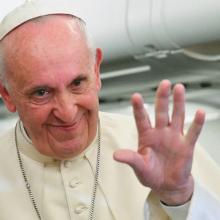Churches
Do churches and religious organizations have a positive impact on the way things are going in the United States?
Americans are divided on that point, according to a Pew Research Center survey released on July 10 that shows they align along predictable party lines.
The Trump administration’s hard-line stance on undocumented immigrants is polarizing: People have responded with either “throw the bums out” or “have a heart.” But the question of whether faith communities can legally offer the undocumented physical sanctuary — sheltering them in churches, synagogues, and mosques to keep them from immigration authorities — is not so cut and dry.
The neighborhood has long been home to numerous historic and not-so-historic houses of worship of nearly every size and type. Here you can find congregations of Muslims, Hebrew Israelites, AMEs, Baptists, Presbyterians, Pentecostals, and everything else in between.
So who cares if a few churches have to be razed to make Harlem “great again,” right?
I do.
A survey released last week by the Pew Research Center suggested a very different view of the presidential actions, especially among white Protestant Christians.
There was strong support among white evangelical Protestants, with more than three-quarters (76 percent) saying they approve of the policies outlined in Trump’s order. Among white mainline Protestants, 50 percent approved.
Many Christians now are asking the question Helena Leffingwell of Arlington, Texas – not a pastor or ministry leader, just a regular member of Gateway Church, a nondenominational megachurch – put into words: “How can we see things so differently?”
“The practices of Immigration and Customs Enforcement right now are not in line with who we say we are as a government and a country,” Kumpf said. “What they did was legally on the line of violating the Sensitive Locations Memo. That’s extraordinarily morally reprehensible.”
Drafted in 2011, the Sensitive Locations Memo places restrictions on ICE enforcement in sensitive locations such as schools, places of worship, and hospitals. Many at the gathering felt that the sensitive lines of sanctuary were crossed on the morning of the Feb 8.
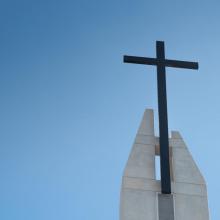
Image via Thanate Rooprasert/Shutterstock.com
First came the mayors of New York, Chicago, and Seattle declaring their cities “sanctuaries”, and saying they will protect undocumented immigrants from President-elect Donald Trump’s plan to deport them.
Then thousands of students, professors, alumni, and others at elite universities, including Harvard, Yale, and Brown, signed petitions, asking their schools to protect undocumented students from any executive order.
Now, religious congregations, including churches and synagogues, are declaring themselves “sanctuaries” for immigrants fleeing deportation.
We write to you on All Saints Day to update you on the situation in Iraq. Remembering the Christians who were killed in 2009 while attending Mass at Our Lady of Deliverance Church in Baghdad. That was the beginning of harder times to all Christians in Iraq.
It has been two years and four months since we left Nineveh Plain. It has been long time of displacement, of humiliation, of exile. However, people always lived in hope of God’s mercy to return and go back home. We believed that God will not fail us.
Pope Francis leaves on Monday, Oct. 31 for an overnight trip to Sweden, a historically Protestant country that today is one of the most secular in the world.
The visit is to mark the start of observances of next year’s 500th anniversary of the Reformation, which traditionally dates from Oct. 31, 1517, when Martin Luther nailed his 95 Theses to the door of a German cathedral.

Image via jennifer leigh selig / Shutterstock.com
New research from Pew suggests that Americans have become less likely to believe that religious institutions can play an important role in confronting social problems.
And while some of the decline in trust in religious congregations likely originates in the “rise of the nones,” or the religiously unaffiliated, that alone does not explain this crisis of confidence. This is not really a story about secularization. After all, between 2008 and 2016, both Protestants and Catholics showed double digit declines in percentage of people who believe houses of worship contribute to social reform. The percentage decline was only slightly higher among the religiously unaffiliated.
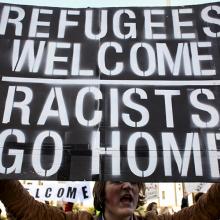
Image via REUTERS / David Ryder / RNS
Johnson Ferry Baptist Church, a Southern Baptist megachurch north of Atlanta, has helped resettle a Syrian family, despite an order from Gov. Nathan Deal that the state would not accept Syrian refugees.
Bryant Wright, the church’s pastor and former president of the Southern Baptist Convention, told CNN Dec. 9 he understands the governor is “concerned about the security of the citizens of the state. But as Christians and as a church, we want to reach out with the love of Christ to these folks.”
He told The Atlanta Journal-Constitution that his church had been planning to help the family before the recent attacks in France.
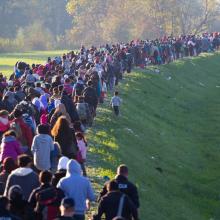
Image via Janossy Gergely / Shutterstock.com
Faith-based agencies that resettle refugees in America stand to gain more than a clear conscience if the United States — after what is expected to be a fierce debate in Congress — accepts a proposed 10,000 Syrian refugees next year.
More refugees also means more revenue for the agencies’ little-known debt collection operations, which bring in upwards of $5 million a year in commissions as resettled refugees repay loans for their travel costs. All nine resettlement agencies charge the same going rate as private-sector debt collectors: 25 percent of all they recoup for the government.
This debt collection practice is coming under increased scrutiny as agencies occupy a growing stage in the public square, where they argue America has a moral obligation to resettle thousands of at-risk Syrian refugees. Some observers say the call to moral action rings hollow when these agencies stand to benefit financially.
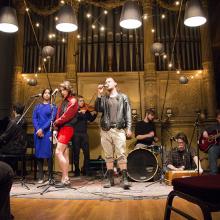
Abhay Singh & Friends performs during Arts Wednesdays at Judson Memorial Church. Photo via Judson Memorial Church / RNS
On the north side of Indianapolis, the historic First Presbyterian Church is now the Harrison Center for the Arts. Its owner, the upstart Redeemer Presbyterian Church, is landlord to two dozen artist studios, three apartments, four galleries, an annual music festival, and the Indiana office of VSA, the John F. Kennedy Center’s nationwide arts program for people with disabilities.
Redeemer is among a host of churches that own old buildings and have embraced the arts as a way of enlivening hallowed spaces, breaking down barriers with neighbors, and paying the heating bills.
It was the sixth annual Blessing of the Bikes at the downtown church — a type of local event that has become more common as a growing number of churches consider the idea that protecting the environment is not just a scientific or political debate, but a spiritual one.
The movement has grown in the past decade and crosses denominations. An “Evangelical Climate Initiative” issued in 2006 has been signed by hundreds of religious leaders, and the Vatican held a one-day summit in late April to “elevate the debate on the moral dimensions of protecting the environment.” Pope Francis is preparing this summer to issue an encyclical — one of the most authoritative church documents — framing climate change action as a moral and religious imperative.
It would be God’s incarnate presence in human life. Not the only presence, but one that many people could enter into. Not so much an institution with structures, rules, and layers of leadership, but rather a dynamic, ever-shifting community that gathered in various ways, ranging from small circles of friends to mass assemblies for special purposes.
It would look outward, unlike other human institutions that look inward. It would see people wanting to draw closer to God. It would see human needs such as grief and tragedy, hunger and hopelessness. It would see key moments in people’s lives, such as partnering and parenting. It would see the ways people hurt each other and the tendency of injustice to become systemic.
Let’s be clear: The much-heralded “decline of Christianity in America” isn’t about God losing faith in humankind.
It isn’t about losing our moral compass thanks to whatever you happen to loathe. It isn’t about fickle millennials. It isn’t about zigging trendy or zagging traditional.
In fact, I would argue that Christianity isn’t in trouble at all. Churches are in trouble. Denominations are in trouble. Religious institutions like seminaries are in trouble. Professional church leaders are in trouble.
But churches can’t hold God hostage.
BY CHANGING THE definition of marriage in its constitution from “between a man and a woman” to “between two people, traditionally a man and a woman,” the Presbyterian Church (U.S.A.) has joined a number of other religious groups in the U.S. in allowing same-sex marriage.
In so doing, the 1.75 million-member denomination completed a dramatic turnaround on marriage equality. In 2012—at a time when same-sex marriage was legal in only a handful of states—the 220th PC(USA) General Assembly was so deeply divided on the issue that it merely called for two years of “serious study and discernment” of Christian marriage.
The 2014 General Assembly—with nearly two dozen states by then having legalized same-sex marriage—voted 429-175 to recommend the constitutional change. By March of this year, the requisite majority of the PC(USA)’s 172 presbyteries (regional governing bodies) had ratified the proposal.
Reaction to the change was immediate, and predictable.
ONE OF MY favorite descriptions for the people of God, what the New Testament calls the “body of Christ,” is the evocative language of “the beloved community” used by Martin Luther King Jr. during the civil rights movement.
A beloved community is a powerful vision of a new coming together, a new community that welcomes all peoples in their diverse ethnicities and nationalities. Everygroup, clan, and tribe is included and invited in. That dream and vision undergirded King’s movement for civil and voting rights, both spiritually and philosophically, and deeply reflected his own underlying moral belief and hope as a Christian minister.
Yet in one of his most famous quotations, King also said this: “I am ashamed and appalled at the fact that 11 o’clock on Sunday morning is the most segregated hour in Christian America.” He said this in 1953, while he was still associate pastor at his father’s Ebenezer Baptist Church in Atlanta. But obviously, and most painfully, that quote is still true today.
Congregations in New York City that rent space in public schools will be able to hold Easter services this Sunday despite a ruling on March 30 by the U.S. Supreme Court rejecting an appeal from an evangelical church in the Bronx that sought to overturn a ban on after-hours worship services at public schools.
A spokesman for Mayor Bill de Blasio also said that the mayor would work to ensure that houses of worship could continue to rent space like any other group.
“Now that litigation has concluded, the city will develop rules of the road that respect the rights of both religious groups and nonparticipants,” Wiley Norvell said in response to the ruling.
“While we review and revise the rules, groups currently permitted to use schools for worship will continue to be able to worship on school premises.”
Pastor Robert Hall of the Bronx Household of Faith, which was the plaintiff in the case, said he was cautiously optimistic after the administration’s response.
“We are gratified that he is allowing the churches to stay,” Hall told The New York Times.
BREAKING NEWS:
There is a nonviolent uprising around immigration happening in Philadelphia and a dozen other U.S. cities. Philadelphia faith leaders announced that they will welcome immigrant families even if it is against the law. They are building a movement of "sanctuary congregations" and have dreams that the U.S. will one day be a sanctuary nation.
We join them in insisting that we must obey the laws of God over the laws of our government — and that means "welcoming the foreigner as if they were our own flesh and blood." (Exodus 22:21, Lev.19:34, etc., etc.).
Jesus says that when we welcome the stranger we welcome him. When God asks: "When I was a stranger did you welcome me?" (Mt. 25) we are not going to say: "Sorry God, Congress wouldn't let us."
We know that sometimes divine obedience can mean civil disobedience.
As St. Augustine once said: "An unjust law is no law at all."






